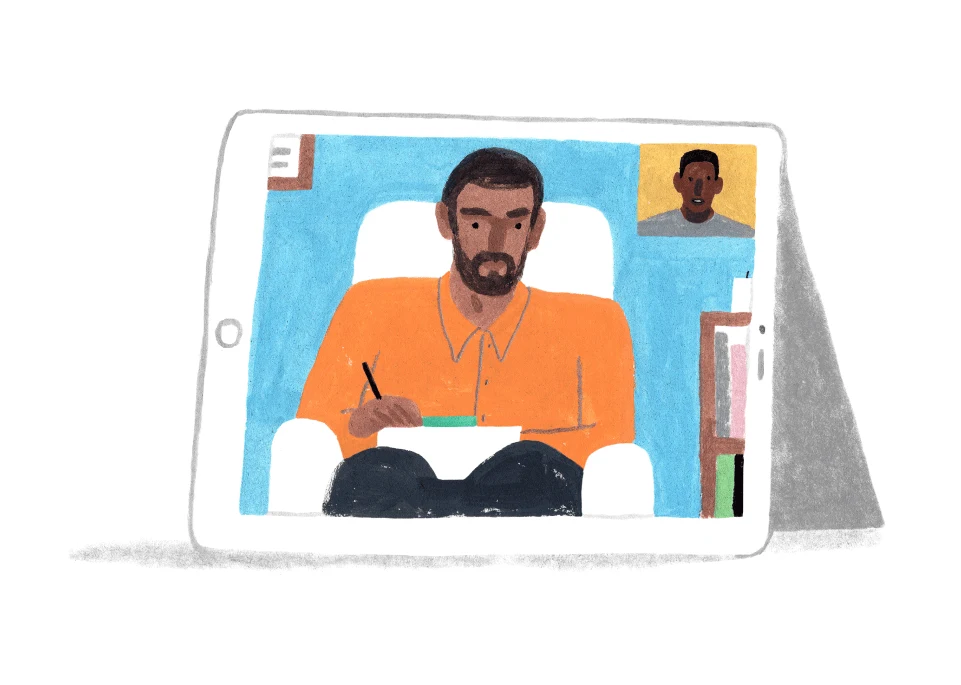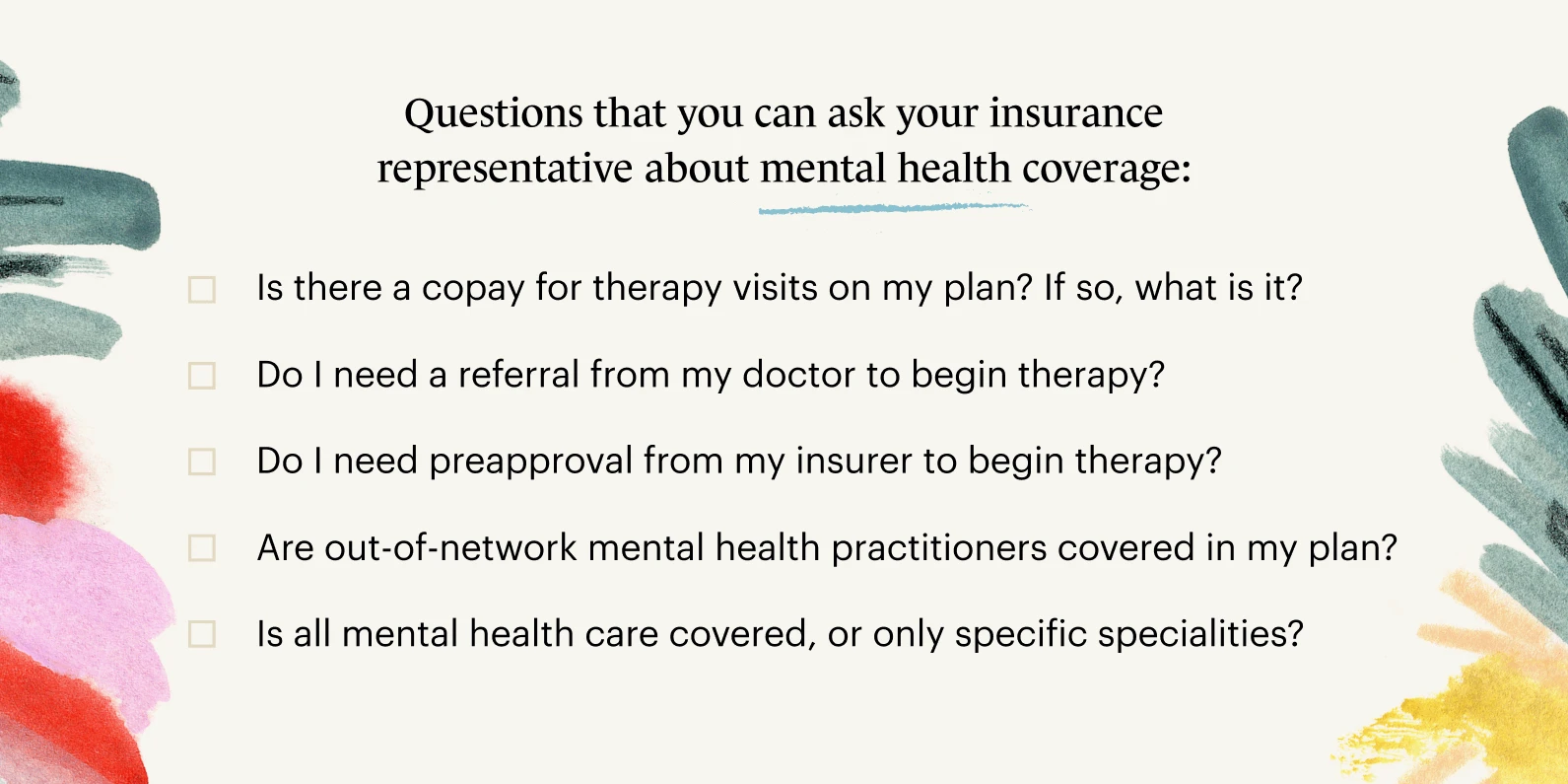Looking for a therapist who takes insurance? We understand it can feel challenging and confusing to find an affordable in-network therapist who accepts your health insurance and meets your needs.
Now, more than ever, people are living paycheck-to-paycheck.
Whether or not you currently have health insurance, there are free and low-cost therapy options available, so you can get access to therapy without insurance.
Ahead we’ll illuminate some tips that can help you find a therapist who takes your health insurance.

First, does health insurance cover therapy?
For those who have health insurance, the great news is that after the passage of the Affordable Care Act (ACA), mental health treatment must be covered as essential health benefits by U.S. healthcare plans.
On the Monarch Directory by SimplePractice, you can find therapists and counselors near you and choose to browse therapists who accept your insurance.
With over 120,000 therapists nationwide listed on Monarch, it’s likely you’ll find one who suits your needs and takes your insurance.
To find out if your health insurance plan provides mental health coverage, check your “description of plan benefits” brochure or the insurance company’s website.
Look for information on behavioral health services or coverage for mental health and substance-use disorders.
You can also call and speak directly with your insurance company. More on this below.
U.S. insurance exchange plans include mental health coverage
For those who don’t currently have health insurance, there are other free and low-cost therapy options that may work for you.
If you’re unemployed, self-employed, a freelance worker, or you run a small business, you can purchase an individual or family plan on the health insurance marketplace (also known as the health insurance exchange) created by the ACA to get millions of uninsured Americans health insurance coverage.
After the ACA was passed into law, everyone with coverage through a U.S. health insurance exchange marketplace plan has access to mental health benefits.

How to find a therapist who accepts your insurance
If you have health insurance, you can visit Monarch to find licensed therapists near you, browse therapists who take your health insurance, and book therapy sessions online.
For example, if you have Kaiser Permanente health coverage, you can quickly view all the therapists who accept Kaiser.

Similarly, you can view therapists who accept United Health Care, Cigna, Anthem, Blue Cross, Optum, Medicaid, and more.
When you view an individual counselor or therapist’s page on Monarch, in the section directly underneath their areas of specialty you’ll see their fees per session and which insurance providers they accept.
You can choose to book in-person therapy sessions or teletherapy online video therapy sessions.
Book a free 15-minute initial consultation session
Many of the therapists on the Monarch directory offer free initial consultations to make sure they are a good fit for your needs.
In most cases, you can book 15-minute free initial consultation sessions directly from the therapist's profile page.

How much will I pay for therapy?
How much you will ultimately pay for therapy varies depending on whether or not you have health insurance, which insurance company and specific plan you have, the therapist you decide to see, and which type of therapy you choose.
As with any other service, therapy rates also depend on where you live.
Consequently, therapy is more expensive in places with a higher cost of living such as New York City, San Jose, San Francisco, and Los Angeles.
Some insurance companies cover all, or nearly all, therapy sessions with in-network therapists. Other insurance companies and plans cover only a portion of the costs.
The best way to learn what you will pay for therapy in-network with your insurance is to check directly with your insurance company via phone or online on your health insurance company’s website.
More tips to find a therapist covered by insurance
Here are some additional suggestions that may help you find a great therapist who takes your insurance plan.
Consult and speak directly with your insurance company
Insurance companies keep online lists of in-network providers. If you aren’t able to find any therapists who accept your insurance by checking on Monarch, consult your insurance company’s online portal.
If you don’t find the answers you need on their website, don’t be afraid to call the contact number to speak directly with an account representative from your insurance company to ask about mental health coverage.
Most insurance cards have a member phone number that you can call directly for support.

Here are some questions to ask your insurance company about your mental health coverage:
Is there a copay for therapy visits on my plan? If so, what is it?
Do I need a referral from my doctor to start therapy?
Do I need pre-approval from my insurer to begin therapy?
Are out-of-network mental health practitioners covered in my plan?
Is all mental health care covered, or only specific specialities?
The more information you have from your insurance provider about the coverage for therapy in your plan, the easier it may be for you to find a covered therapist to get you the support you need.
Talk to your doctor
If you have a primary care doctor or general practitioner, they may also be able to help you find a mental health provider.
Set up an appointment with your doctor, and explain that you’d like to start therapy, and ask if they can refer you to an in-network therapist or clinic.
They may have local clinics they refer patients to regularly, therapists they work with and trust, or ideas about where to find a clinician that feels right for you.
Remember that your doctor can be an ally in helping you navigate your full body wellness, which includes your mental health.
Depending on your relationship with your doctor, they can be a great person to ask for help in finding a therapist who may be a fit for your needs.
What if my insurance doesn’t cover therapy?
If your insurance plan does not cover therapy, or you can’t find an in-network therapist aligned with your needs, you can still get therapy by paying out-of-pocket.
Consider working with an out-of-network provider.
Many insurance companies will reimburse you after your deductible has been met.
If you have health insurance and choose to pay out-of-pocket, you’ll want to first contact your insurance company to fully understand your mental health benefits, and then ask your potential therapist if they can provide you with a superbill you can submit to your insurance company for reimbursement.
Another option is to consider being a “cash pay” client with your counselor or therapist.
For cash pay clients, many therapists offer sliding scales, discounts, or payment plan options, and even take FSA or HSA cards if you have this benefit through your work.
Other ways to make therapy affordable if you’re not using insurance is to check with your job to see if they offer an EAP.
You may even be able to get free therapy through a nonprofit clinic.
There are also community nonprofits all over the country that offer free or low cost therapy for low-income people, often staffed with pre-licensed mental health providers who are working to get their hours for licensure.
These therapists have all completed graduate school, but need a certain number of hours treating patients before they are officially licensed. They are usually supervised by a licensed therapist.
NAMI (the National Alliance for Mental Illness) also offers many resources on finding a therapist or psychiatrist for little or no cost in the U.S.
If you want to see a therapist but have concerns about cost, explore all the available options for affordable mental health support and care.
Finally, be sure to check out the Monarch Directory to find therapists and counselors with availability and online booking.

You can choose to book a free 15-minute initial consultation, in-person therapy sessions that fit your schedule, or telehealth video therapy sessions.
On each individual therapy provider’s page, in the section directly underneath their areas of specialty, it shows their fees per session as well as which insurance providers they accept. This helps to provide transparency about the cost of therapy and coverage.
READ NEXT: Affordable and Low-cost Therapy Options
Need to find a therapist near you? Check out the Monarch Directory by SimplePractice to find mental health practitioners with availability and online booking.





